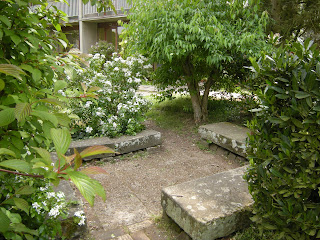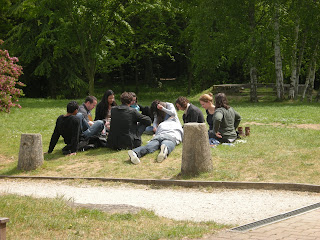As I've talked about before, I've been doing a fair amount with a church close to where I live, L’Église reformée du Marais. It's only a 15 min. walk from my apartment. Last Wednesday I volunteered to make the meal for the student group that meets every Wednesday night. I was nervous about this because, you know, food is really a specialty of the French. They've all eaten plenty of very good meals. I made chili for them, because I don't know many French dishes and chili is something I feel like I make well. Also, I knew they would like an "American" dish. Before I bought the ingredients I asked the guy I cooked with, a great guy from Madagascar named Ony, how spicy I should make the chili. I didn't want to overwhelm my friends, I said, but spicy is really an innate quality of chili. He agreed, and said that I should make it a little spicy, and that they would just have to deal with it :) When the meal was served, some of the students were tentative at first. They didn't take very much and ate slowly. One of them told me it was quite spicy for her. The leader of our group, an English guy named Alex, told me that this was as much spice as he could stand before whatever he was eating turned from wonderful to unbearable. (I eat spicy things regularly in the U.S. but I am not known as someone who conquers spice. The chili was so mild that unless I thought about it, I didn't notice the spice as I ate). After awhile, though, I noticed a lot of people taking second helpings. And when I left there were no leftovers! I think it was a success.

Then this past weekend I went on a retreat with the same student group. We took a train to the little town of Melun, about 50 kilometers from Paris, where there is a YMCA lodge/center built on several acres of land. On Saturday we arrived at the center along with several hundred scouts (pronounced "scoots" in French, and girls and boys were together). They didn't bother us because they stayed at a campsite, but we heard them yelling in the distance throughout Saturday and Sunday. The grounds of the center were beautiful - flowers and flowering trees were everywhere, little stone paths crisscrossed the landscape, and places to sit made out of rocks were scattered around.
 The weather in Paris has been unpleasant for the past few weeks, and so I was grateful for the few hours of sun and warmth before it began to rain that evening. There also isn't a whole lot of green in Paris, especially where I live, which isn't close to any parks.
The weather in Paris has been unpleasant for the past few weeks, and so I was grateful for the few hours of sun and warmth before it began to rain that evening. There also isn't a whole lot of green in Paris, especially where I live, which isn't close to any parks.Besides the times of discussion, prayer, worship, and hearing from a pastor named Youssra who joined us on the trip, we hung out and played games. On Saturday night we played loups-garous (werewolves), which is very similar to Mafia. I liked this version of the concept better, though, because there were a lot more possible roles. The French are known for loving debate, and I have noticed that discussions can reach a level that I would consider to be an angry argument, but that in reality is culturally appropriate. This meant that a game like loups-garous was very fun to play with French people (For those who don't know the game, identities are passed out and 2-4 people are designated werewolves and they kill off the villagers one by one at night, and everyone has to figure out who they are during debating sessions in between each murder.) No one was shy about making accusations, and anyone who was accused immediately went on the defensive. For several minutes at a time the room would be full of yelling and laughing as we all threw ourselves into the scenario. We played the game twice; once I was the sorcerer (the doctor) and once I was indeed a werewolf. After some of the students had retired to bed I stayed up longer to play another game, Jungle Speed, which was kind of like Uno, except that the rules seemed rather flexible. It took me at least 30 minutes to begin to understand the game, including the important point that we were trying to get rid of our cards and not gain all the cards. Despite not even realizing this for several rounds I won the game twice and fell out of my chair once when I made the mistake of going for the little totem that is a part of the game at the same time as Barth.
I have to say a little bit about the food. We were at a YMCA camp and we ate cafeteria-style meals. For an American this means pretty bad food: fake mashed potatoes, rubbery meat, little cartons of milk. But no, we were still in France. We had haute-savoie-style pasta with butter, a sort of tomato and beef stew, and there were always baguettes. To drink we could choose from beer, wine, or Coke in a glass bottle, and the salads were always artfully arranged.

The last thing I want to mention is how incredibly nice everyone was to me on the trip. I feel guilty sometimes around these kids, because I worry that as a foreigner who is still working on my French skills I am just a burden to them. But almost everyone made it a point to talk to me at least once during the trip, and I found myself taking part in group conversations more often than I ever have before due to how welcomed I felt. I had long conversations: with Audrey about the French scouts and about her journey towards knowing God, with Rachel about languages, and with several others. The only time that I became profoundly aware of my difference was when I was in a group trying to make up a skit, and all of the girls went into full French-humor mode, using words that I had never heard of before, naming celebrities that I didn't know, and in general making jokes that I only kind of understood while they laughed insanely. However, this situation works both ways, and I try to keep that in mind: my French friends need to be welcoming and patient with me, and I need to understand that there will be times when they want to truly be themselves around each other. Living in a foreign country for so long and especially trying to integrate myself into a group like this has lent a me a lot of insight into the lives of the many immigrants in America who try to integrate themselves into society, many of whom deal with larger cultural differences and live abroad for much longer.
